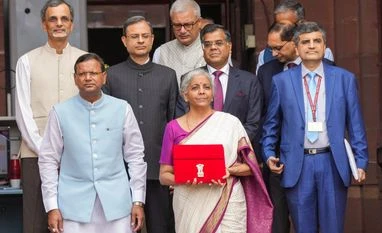Union Finance Minister Nirmala Sitharaman presented the Interim Budget on February 1, 2024, as the Narendra Modi government sought re-election in the Lok Sabha polls scheduled for April-June. Sitharaman delineated the government's financial plans and projections for the upcoming financial year, with a focus on growth and sustainability.
Key highlights of the Interim Budget:
Expenditure
- Total spending: The government projected an expenditure of Rs 47.65 trillion for FY25, marking a 6 per cent increase over the revised estimate for FY24.
- Interest payments: These formed a substantial portion, with 25 per cent of the expenditure allocated for interest payments, amounting to 40 per cent of revenue receipts.
Receipts
- Revenue growth: Receipts, excluding borrowings, were expected to rise by 12 per cent to Rs 30.80 trillion in FY25, driven largely by a 12 per cent increase in tax revenue.
GDP growth
- Nominal GDP: The government anticipated a nominal GDP growth rate of 10.5 per cent for FY25, factoring in both real growth and inflation.
Deficits
- Revenue deficit: Targeted at 2 per cent of GDP, down from the revised estimate of 2.8 per cent in FY24.
- Fiscal Deficit: Set at 5.1 per cent of GDP, a reduction from the revised 5.8 per cent of GDP in FY24.
New schemes and allocations
- Economic affairs: The Department of Economic Affairs received Rs 70,449 crore for new schemes, focusing mainly on capital expenditure, representing 7.5 per cent of the total capital outlay.
Tax proposals
- Tax rates: No changes were made either to direct or indirect tax rates.
- Extended benefits: Direct tax benefits for startups, sovereign wealth funds, pension funds, and certain International Financial Services Centres (IFSC) units have been extended until March 2025.
Policy highlights
- Railways: Launch three key economic railway corridor initiatives and upgrade 40,000 rail bogies to Vande Bharat standards.
- Housing: Construction of an additional 20 million houses under the Pradhan Mantri Awas Yojana-Gramin and a new scheme to assist middle-class families in buying or building homes.
- Health: Initiatives include promoting cervical cancer vaccinations for girls aged 9-14, launching the U-WIN platform for immunisation management, and extending healthcare coverage under Ayushman Bharat to Accredited Social Health Activist (ASHA) and Anganwadi workers.
- Energy: Plans to achieve rooftop solarisation of 10 million households, blending biogas with compressed natural gas/piped natural gas (CNG/PNG), and generating 100 metric tonnes of coal gasification and liquefaction capacity by 2030.
- Environment: Enhancing electric vehicle manufacturing and charging infrastructure, adopting e-buses, launching Blue Economy 2.0, and promoting eco-friendly alternatives like biodegradable polymers and bioplastics.
- Agriculture: Promotion of public and private investment in post-harvest activities, expanded application of Nano di-ammonium phosphate (DAP) fertiliser, and extending the PM Matsya Sampada Yojana to enhance aquaculture productivity and seafood exports.
Demography
- High-powered committee: Establishment of a committee to manage population growth and demographic issues.
- Research: Establishment of Rs 1 trillion corpus to support private-sector research and innovation through low-interest loans.
- Tourism: Encouragement for states to develop and promote tourist centres, with plans for providing long-term interest-free loans for tourism projects.
- Jewellery: Jewellery stocks fell as the government kept the import tax on gold at 15 per cent, which disappointed the industry hoping for a reduction to stimulate demand and reduce illegal imports.
High hopes from Union Budget 2024
Expectations are high as Nirmala Sitharaman is set to present her seventh Budget in the Lok Sabha today. This also marks the Modi government’s 13th Budget since coming to power in 2014.
The Budget will not only reflect the Modi government’s decade-long performance but will also outline a roadmap for making India a developed nation. Key focus areas are expected to include reforms in the income tax structure and measures to enhance the ease of doing business in India.
Congress leader Ajay Rai expressed his expectations for the Budget 2024, emphasising the need to control inflation. "In this Budget, inflation should be controlled. The price of garlic is Rs 500 per kg, and the prices of vegetables and medicines have gone up. The price of life-saving drugs has increased. Employment opportunities also need to be generated. All these factors need to be worked upon."
Just one day ago, Sitharaman tabled the Economic Survey in Parliament along with a statistical appendix. This will be the first full Budget of the BJP-led National Democratic Alliance (NDA) government in its third term.
(With agency inputs)
)